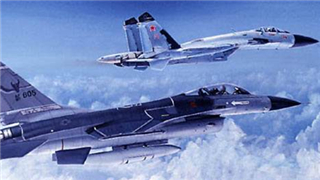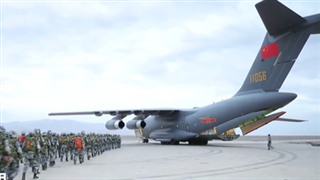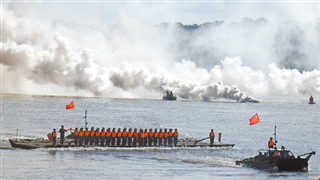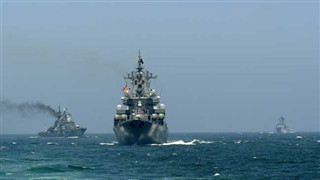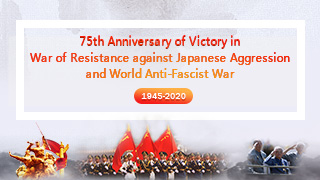By Pan Zeqing
Preface
China's War of Resistance against Japanese Aggression is a righteous war by the Chinese people to resist the invasion of Japanese militarists and gain national independence and liberation, and also an integral and important part of the World Anti-Fascist War. During the war, the Chinese nation fought fearlessly with amazing courage and tremendous sacrifices, not only winning the war of national liberation but also making great contributions to the overall victory of the World Anti-Fascist War.
China's War of Resistance against Japanese Aggression exploited the main battlefield of the World Anti-Fascist War in the East.
The war against fascism was a common cause of all people in the world. China was the first country to fight the war against fascists and opened the first large-scale anti-fascist battlefield in the world. The Chinese people were undaunted pioneers in this great war to save human civilization and safeguard world peace.
Chinese people lifted the curtain on the World Anti-Fascist War. In 1931, Japan intentionally instigated the September 18th Incident and invaded northeast China, launching the first warfare in the Fascist external aggression and expansion and seriously threatening the peace and stability in the Far East as well as the whole world. In face of Japanese aggression, the Communist Party of China (CPC) called for armed resistance and the Chinese people, refusing to be conquered by the invaders, fired the first shot in the World Anti-Fascist War. The battles of resistance in different places in China lent heavy blows to the ambitious arrogance of Japanese Fascists.
Chinese people blazed the first large-scale battlefield in the World Anti-Fascist War. In 1937, Japan blatantly created the July 7th Incident and launched all-round aggression against China, and deployed most of its military forces on the battlefield in China in an attempt to finish the war quickly and wipe China off the map. Nevertheless, the Chinese people, under the banner of the Chinese united front against Japanese aggression initiated by the CPC and based on the cooperation between the CPC and Kuomintang (KMT), fought against the invaders across the country. By October 1938, China and Japan had sent more than 4 million troops into the war, with the battlefront lasting over 1,800km and bombs and gunfire engulfing more than 10 provinces and regions over an area of about 1.6 million square kilometers. Over 400 million Chinese were involved in the war directly or indirectly.
Chinese people kept holding up high the anti-fascist banner in the East. During the War against Fascism, many foreign militaries more powerful than the Chinese military were defeated and many countries stronger than China surrendered for various reasons, but Chinese people didn’t give up the fight against Japanese militarism because of temporary difficulties. The CPC became the mainstay in the war of resistance against Japanese aggressors with the unity of whole nation. From 1931 to 1939 when large-scale battles unrolled in Europe, the Chinese people had already fought independently the war against Japanese aggression for eight years, ten years by 1941 when the war spread to the whole world. After the Pacific War broke out, the majority of Japanese troops stayed in China, which was the main battlefield in Asia where the allied powers fought Japanese Fascists. As a semi-colonial and semi-feudal country, China didn’t for one moment falter in the teeth of Japanese aggression, setting for world anti-fascist countries a good example of a weak country defeating a strong one and invigorating the global morale against the fascists.
China's War of Resistance against Japanese Aggression strategically coordinated with and supported the allied powers.
During WWII, Japanese Fascists colluded with their German and Italian counterparts to form the axis powers or the Fascist bloc, in the wild attempt to split and dominate the world. China was the first and the most active country to push forward the formation of a united anti-Fascist front, and China's War of Resistance against Japanese Aggression hindered the invading steps of the Japanese Fascists and provided strong strategic support for the allied nations to implement their “Europe first, Asia later” strategy.
China's War of Resistance against Japanese Aggression disrupted Japan’s “to the north” strategy and helped the Soviet Union avoid a two-front war, the northward invasion into the Soviet Union was an important component of Japan’s global domination strategy. In 1938-1939, the Japanese Kwantung Army stirred up the Changkufeng Incident and the Nomonhan Incident and engaged in armed conflicts with Soviet troops. But the Japanese army in northeast China only to find itself defeated by overwhelming Soviet troops as the Chinese battlefield held back the main force of the Japanese Army. Later, Germany and Japan conspired to sandwich the Soviet Union several times, but Japan was never able to move north because of the fierce resistance it encountered in China. The valiant war of resistance against Japanese aggressors by the Chinese people brought safety to the far east region of the Soviet Union, and kept the Soviet Union from the danger of having to fight on both the east and west frontlines at the same time, so that it could concentrate on fighting the German Fascists. From the winter of 1941 to the fall of 1944, the Soviet Union dispatched 540,000 troops, more than 5,000 artilleries, and 3,300 tanks from its far east region to reinforce its strength on the west battlefront against Germany.
China's War of Resistance against Japanese Aggression slowed Japan’s steps “to the south” and bought valuable time for the allied nations to get ready for the war. “To the south” was also an important part of Japan’s strategy to claim global domination, but it had not been put on the agenda as most of the Japanese army troops were bogged down in China. In the winter of 1937, 21 of the 24 Japanese army divisions were stranded in the Chinese theater, which increased to 32 out of 34 in the winter of 1938, 34 out of 41 in the winter of 1939, and 38 out of 49 in the winter of 1940. After Japan started the Pacific War, because of Chinese people’s dauntless resistance against the invaders, the Japanese Fascists carried a heavy burden of waging an aggressive war in China when “going south”, thus smashing their strategic scheme to join force with the German and Italian Fascists in the Middle East and Siberia before dominating the world. If it weren’t for China, if China were defeated, you could imagine how many Japanese divisions could be deployed elsewhere. They could have taken Australia, India right away, said Franklin Roosevelt thankfully.
China's War of Resistance against Japanese Aggression ensured the implementation of “Europe first, Asia later” strategy of the allied nations. After the Pacific War broke out, the allied nations adopted the global anti-Fascist strategy of “Europe first, Asia later”, which, however, was premised on the stable resistance against Japanese troops in the Far East and Pacific region, for which China’s war against Japanese aggressors played a critical role. At that time, Japan put 35 army divisions in China, while leaving only 10 divisions in the Pacific front, which resulted in abortion of the Japanese navy’s plan to attack Australia, occupy Ceylon, and join force with German troops in the Indian Ocean due to shortage of troops. Even in 1943 when American troops began to launch strategic counterattacks in the Pacific, about 64% of army and 45% of air force of Japan were still deployed in China, and the Japanese side dared not drastically reduce its troops there, so much so that it still took China as the main direction of operations at the end of the war when American troops were approaching the Japanese mainland. There were more than one million Japanese army troops trapped in China when the militaristic country surrendered in 1945.
China's War of Resistance against Japanese Aggression plays a decisive role in the overturn of Japanese invaders.
The people of all Asian countries made their contributions to defeating the Japanese Fascists. Indeed, the American and Britain allied forces fought hard in the Pacific front, and the Soviet Union sent troops to attack the Japanese army in northeast China, these all inflicted a heavy blow upon Japanese aggressors and accelerated their collapse, yet it was the Chinese people that played the decisive role in bringing down the Japanese Fascists.
As the main battlefield against Japanese aggressors, China annihilated the most Japanese troops at the highest price. From the July 7th Incident in 1937 to the eve of the breakout of the Pacific War in 1941, Japan sent more than 70% of its troops to China, even more than 90% at most, and continued to keep over 1 million troops there even after the Pacific War broke out. During the war, more than 1.5 million Japanese troops were annihilated by Chinese armed forces and people, accounting for over 70% of Japan’s total military casualties during WWII, and 1.28 million Japanese troops surrendered to China after the defeat of Japan. Such glorious military exploits came with enormous sacrifices. Incomplete statistics indicated over 35 million military and civilian casualties on the Chinese side, accounting for 1/3 of the total casualties of all countries during WWII. The war also cost China more than USD100 billion economic losses directly and over USD500 billion indirectly.
China was an important rear base in the Asia-Pacific region for the allied nations as it provided them with a number of air force bases, frontline airfields, and ground maintenance personnel in Chengdu, Kunming, Liuzhou and Zhijiang to support their operations against Japanese troops. China also provided the allied nations with huge masses of urgently needed strategic materials like tin, tungsten and tung oil as well as valuable military intelligence. During the war of resistance against Japanese aggression, the Soviet Union stationed a military intelligence team in Yan’an, the US military set up radio stations in the CPC-founded rear bases in northern, central and southern China, where they collected intelligence on Japanese troops and meteorological information provided by the CPC-led armed forces and local people, and also built weather stations, hydrological stations and radio communication network in the main rear area of China. This strategic support provided by China to the allied nations played an important part in defeating Japanese Fascists.
China, despite mounting difficulties, also sent troops overseas to help the allied nations fight Japanese invaders in Myanmar. Occupying Myanmar and attacking India was an important strategic goal in Japan’s global ambitions and a key link in its strategic coordination with German troops. In 1942, to stabilize the situation in Myanmar and support the British troops, China sent 100,000 expeditionary forces to Myanmar in consideration for the overall situation of the World Anti- Fascist War while it also confronted enormous difficulties in fighting against Japanese aggressors, and successfully saved about 7,000 British troops besieged by Japanese enemies. From October 1943 to March 1945, according to the allied nations’ strategic counterattack plan, Chinese troops in India and the expeditionary forces launched offensives in northern Myanmar and western Yunnan , which coordinated with British forces’ operation in India’s Imphal and partly relieved the allied nations of their pressure in India and Myanmar, fully demonstrating China’s spirit of cooperation and national sacrifice in the war against Fascism. The combats in Yunnan and Myanmar lasted more than three years, during which China dispatched 300,000 troops there and annihilated more than 60,000 Japanese troops. Had Japanese troops advanced to the western Indian Ocean, it would have for sure led to devastation of all our positions in the Middle East. Only China could keep that from happening, the then British Prime Minister Winston Churchill said sincerely.
